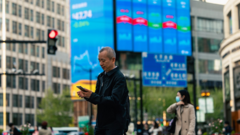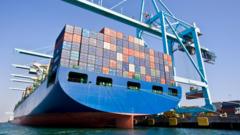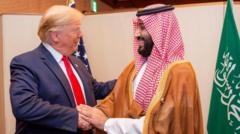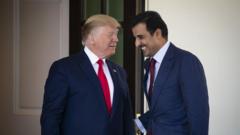US officials vow to hold firm on new tariffs as protests erupt nationwide against President Trump's trade policies.
**Trump Administration Staunchly Defends Tariff Strategy Amid Market Turbulence**
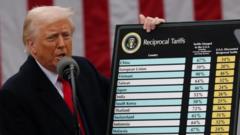
**Trump Administration Staunchly Defends Tariff Strategy Amid Market Turbulence**
The US government insists on continued tariffs despite significant stock market drops and international pushback.
In the face of financial market volatility and mounting international tension, officials in President Donald Trump's administration have reaffirmed their commitment to the controversial tariffs on imports. Speaking in various interviews, Treasury Secretary Scott Bessent downplayed the recent steep declines in the stock market, which saw all three major indices in the US drop over 5% on Friday. He asserted there was "no reason" to foresee a recession arising from the current economic turbulence, branding it merely "an adjustment process."
Commerce Secretary Howard Lutnick echoed this sentiment, proclaiming during an interview that the newly implemented 10% baseline tariff on all imports is here to stay for the foreseeable future. He asserted that the proposed higher tariffs on over 60 nations—perceived as "worst offenders"—would take effect as scheduled on April 9th. Lutnick underscored Trump’s seriousness about these tariffs by reiterating, “He wasn’t kidding.”
Amid this fierce position on tariffs, a noticeable international response has emerged. More than 50 countries have reached out to the Trump administration to negotiate terms, as highlighted by advisor Kevin Hassett. Details regarding which countries have made contact remain scarce. Notably, Indonesia and Taiwan have refrained from retaliatory practices against recently imposed tariffs, while Vietnam's leadership has sought a postponement on a hefty 46% duty due to be enacted by the US.
China, in stark contrast, announced plans for a 34% tariff on all US goods, set to take effect shortly. The repercussions of Trump's tariff strategy have fostered widespread dissent, leading to large anti-Trump protests across major US cities over the weekend. Protesters voiced concerns ranging from the economic implications of these policies to broader social grievances.
As protests continue to unfold, the world watches closely for potential repercussions in Asian markets when they resume trading. Prime Minister Sir Keir Starmer of the UK has expressed concerns regarding the global economic landscape, emphasizing the necessity for a new economic accord that mitigates trade hostilities. Meanwhile, Israeli Prime Minister Benjamin Netanyahu is slated to engage in trade discussions with Trump in Washington, marking a notable diplomatic meeting since the enactment of the new tariffs.
The unfolding situation remains tense, with the Trump administration adamant about its trade policies despite escalating global implications.
Commerce Secretary Howard Lutnick echoed this sentiment, proclaiming during an interview that the newly implemented 10% baseline tariff on all imports is here to stay for the foreseeable future. He asserted that the proposed higher tariffs on over 60 nations—perceived as "worst offenders"—would take effect as scheduled on April 9th. Lutnick underscored Trump’s seriousness about these tariffs by reiterating, “He wasn’t kidding.”
Amid this fierce position on tariffs, a noticeable international response has emerged. More than 50 countries have reached out to the Trump administration to negotiate terms, as highlighted by advisor Kevin Hassett. Details regarding which countries have made contact remain scarce. Notably, Indonesia and Taiwan have refrained from retaliatory practices against recently imposed tariffs, while Vietnam's leadership has sought a postponement on a hefty 46% duty due to be enacted by the US.
China, in stark contrast, announced plans for a 34% tariff on all US goods, set to take effect shortly. The repercussions of Trump's tariff strategy have fostered widespread dissent, leading to large anti-Trump protests across major US cities over the weekend. Protesters voiced concerns ranging from the economic implications of these policies to broader social grievances.
As protests continue to unfold, the world watches closely for potential repercussions in Asian markets when they resume trading. Prime Minister Sir Keir Starmer of the UK has expressed concerns regarding the global economic landscape, emphasizing the necessity for a new economic accord that mitigates trade hostilities. Meanwhile, Israeli Prime Minister Benjamin Netanyahu is slated to engage in trade discussions with Trump in Washington, marking a notable diplomatic meeting since the enactment of the new tariffs.
The unfolding situation remains tense, with the Trump administration adamant about its trade policies despite escalating global implications.



